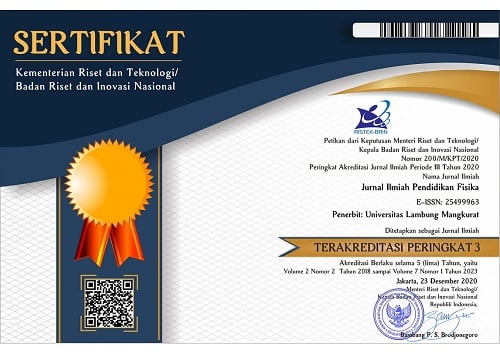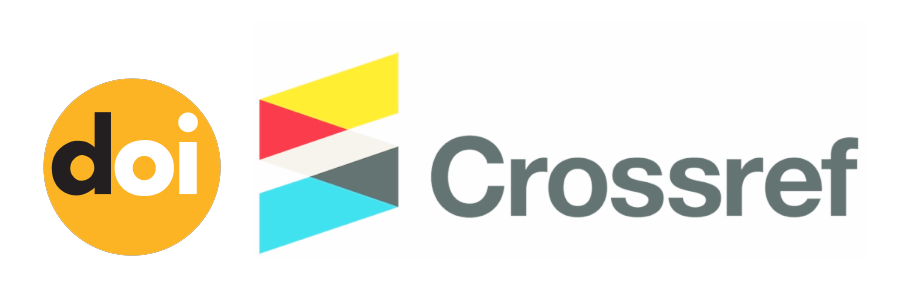E-Module of Physics Science Integrated with Sustainable Development Goals to Enhance Students' Environmental Literacy
Abstract
This study aims to produce a product of an electronic module on the subject of energy to enhance students' environmental literacy. This research was a research and development (R&D) using the ADDIE development model which includes: 1) the initial needs analysis stage to determine the needs of students and teachers, 2) the design stage which included collecting references, instruments and designing and creating an e-module of the science of physics integrated Sustainable Development Goals (SDGs), 3) the development of e-modules was carried out using the Canva application, Fliphtml and validation of material and media experts, 4) small-scale trials conducting interviews with students and teachers to obtain qualitative data in-depth, 5) evaluation from users, namely students and subject teachers. The assessment included 1) a Media expert test; 2) a material expert test; 3) user tests; 4) a small-scale test. The results of this study showed that: (1) the SDGs integrated science e-module was produced to enhance students' environmental literacy (2) the quality of the science e-module for students was developed according to material experts and media experts to have very good quality (VG) with the ideal percentage of each 83.00% and 98.00%. (3) the teacher's response to the student module is Very Good (VG) with an ideal percentage of 98%. Meanwhile, the student's response to the student's science e-module is Strongly Agree with an ideal percentage of 83.00%. Based on the results of this study, it can be concluded that the Science E-Module Integrated to SDGs has met the criteria of being feasible and effective for enhancing students' environmental literacy skills seen from the responses of media experts, material expert responses, students’ responses and trials.
Keywords
Full Text:
PDFReferences
Ajibike, W. A., Adeleke, A. Q., Mohamad, F., Bamgbade, J. A., Nawi, M. N. M., & Moshood, T. D. (2021). An evaluation of environmental sustainability performance via attitudes, social responsibility, and culture: A mediated analysis. Environmental Challenges, 4(March), 100161. https://doi.org/10.1016/j.envc.2021.100161
Darmaji, D., Astalini, A., Kurniawan, D., Parasdila, H., Irdianti, I., Susbiyanto, S., ... & Ikhlas, M. (2019). E-module based problem solving in basic physics practicum for science process skills. International Journal of Online and Biomedical Engineering, 15(15), 5.
Didham, R. J., & Ofei-Manu, P. (2020). Adaptive capacity as an educational goal to advance policy for integrating drr into quality education for sustainable development. International Journal of Disaster Risk Reduction, 47(March), 101631. https://doi.org/10.1016/j.ijdrr.2020.101631
Firmadani, F. (2020). Media pembelajaran berbasis teknologi sebagai inovasi pembelajaran era revolusi industri 4.0. Prosiding Konferensi Pendidikan Nasional, 2(1), 93–97. http://ejurnal.mercubuana-yogya.ac.id/index.php/Prosiding_KoPeN/article/view/1084/660
Gottlieb, D., Vigoda-Gadot, E., Haim, A., & Kissinger, M. (2012). The Ecological footprint as an educational tool for sustainability: a case study analysis in an israeli public high school. International Journal of Educational Development, 32(1), 193–200. https://doi.org/10.1016/j.ijedudev.2011.03.007
Harahap, M., & Siregar, L. M. (2018). Mengembangkan sumber dan media pembelajaran. Educational, January 2–3. https://doi.org/10.13140/RG.2.2.19282.86721
Ichsan, I. Z., Dewi, A. K., Hermawati, F. M., & Iriani, E. (2018). Pembelajaran IPA dan lingkungan: Analisis kebutuhan media pembelajaran pada sd, smp, sma di tambun selatan, bekasi. JIPVA (Jurnal Pendidikan IPA Veteran), 2(2), 131. https://doi.org/10.31331/jipva.v2i2.682
Kamil, P. A., Putri, E., Ridha, S., Utaya, S., & Utomo, D. H. (2020). Promoting environmental literacy through a green project: A case study at adiwiyata school in Banda Aceh City. IOP Conference Series: Earth and Environmental Science, 485(1), 012035. IOP Publishing.
Limani, Y., Hajrizi, E., Stapleton, L., & Retkoceri, M. (2019). Digital transformation readiness in higher education institutions (HEI): The case of kosovo. IFAC-PapersOnLine, 52(25), 52–57. https://doi.org/10.1016/j.ifacol.2019.12.445
Maslin, N. M. (2021). Impact of modern technology. HF Communications, 3, 165–182. https://doi.org/10.1201/b12574-14
McGain, F., Muret, J., Lawson, C., & Sherman, J. D. (2020). Environmental sustainability in anaesthesia and critical care. British
Journal of Anaesthesia, 125(5), 680–692.
https://doi.org/10.1016/j.bja.2020.06.055
Metekohy, B., Sahertian, N. L., & Ming, D. (2021). Contribution of Token Type Cooperative Learning Models for in the Haruru Christian Middle School. Psychology and Education, 58(2), 982-994.
Muruganantham, G. (2015). Developing of e-content pcakge by using ADDIE Model. International Journal of Applied Research, 1(3), 52–54. www.allresearchjournal.com
Nofiana, M. (2017). Profil kemampuan literasi sains siswa smp di kota purwokerto ditinjau dari aspek konten, proses, dan konteks sains. JSSH (Jurnal Sains Sosial dan Humaniora), 1(2), 77-84.
Okubo, K., Yu, J., Osanai, S., & Serrona, K. R. B. (2021). Present issues and efforts to integrate sustainable development goals in a local senior high school in japan: A case study. Journal of Urban Management, 10(1), 57–68.
https://doi.org/10.1016/j.jum.2021.02.002
Poultsakis, S., Papadakis, S., Kalogiannakis, M., & Psycharis, S. (2021). The management of digital learning objects of natural sciences and digital experiment simulation tools by teachers. Advances in Mobile Learning Educational Research, 1(2), 58–71. https://doi.org/10.25082/amler.2021.02.002
Rashid, L. (2019). Entrepreneurship education and sustainable development goals: A literature review and a closer look at fragile states and technology-enabled approaches. Sustainability, 11(19), 5343.
Ratna, F. (2018). Integrasi PBL-STEM pada mata kuliah kimia lingkungan untuk meningkatkan literasi lingkungan dan kreativitas mahasiswa calon guru kimia [Universitas Pendidikan Indonesia]. http://repository.upi.edu/34409/
Reznichenkoa, S. I., Nartova-Bochavera, S. K., & Irkhina, B. D. (2021). Do Authentic People Care about the Environment? A View from Two Paradigms. Psychology in Russia: State of the Art, 14(3), 81–102. https://doi.org/10.11621/pir.2021.0306
Rosana, M. (2018). Kebijakan pembangunan berkelanjutan yang berwawasan lingkungan di Indonesia. Kelola: Jurnal Sosial Politik, 1(1), 148-163.
Setyaningrum, T. W., & Gunansyah, G. (2020). Praktik Pembelajaran Ekoliterasi Berorientasi Pendidikan untuk Pembangunan Berkelanjutan di Sekolah Dasar Negeri Kota Surabaya Bagian Barat. Jurnal Penelitian Pendidikan Guru Sekolah Dasar, 8(2), 375–384.
Setyaningsih, A., Manoppo, Y., Solissa, E. M., Solong, N. P., & Hendrajaya, H. (2023). The strategy of principle leadership in elevating teaching learning process in school. Journal on Education, 5(3), 7036-7042.
Spiteri, J. (2023). Intergenerational learning: Environmental literacy in the family and beyond. In Educating for Sustainability in a Small Island Nation: Voices from Early Childhood Education (pp. 191-207). Cham: Springer International Publishing.
Tarpani, R. R. Z., Alfonsín, C., Hospido, A., & Azapagic, A. (2020). Life cycle environmental impacts of sewage sludge treatment methods for resource recovery considering ecotoxicity of heavy metals and pharmaceutical and personal care products. Journal of Environmental Management, 260(January), 109643. https://doi.org/10.1016/j.jenvman.2019.109643
Teh, P. L., Adebanjo, D., & Kong, D. L. Y. (2021). Key enablers and barriers of solar paver technologies for the advancement of environmental sustainability. Heliyon, 7(10), e08189. https://doi.org/10.1016/j.heliyon.2021.e08189.
Wijaya, B. R., Setyawan, A., & Citrawati, T. (2021). Validity of practicum module based on guided inquiry to facilitate students’science process skills. CITRA: International Journal of Community service, Informatics, Technology, Research in education, Art and humanities, 1(1), 89-99.
DOI: https://doi.org/10.20527/jipf.v7i1.6844
Refbacks
- There are currently no refbacks.
Indexed by: Jurnal Ilmiah Pendidikan Fisika is licensed under a creative commons attribution-share alike 4.0 international license
Statistics Counter |
















